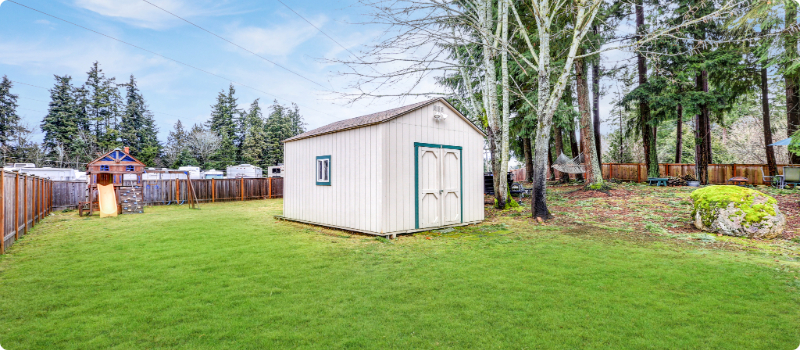Annual home insurance renewal tips
Updated June 3, 2024 . AmFam Team
Life is full of exciting changes, and as they happen, it’s important that your insurance keeps up. From renovating your kitchen to adding a gazebo to your backyard, your homeowners policy should align with everything you have to protect. So, when exactly should you review your homeowners insurance? Below are nine prime instances when you should check in with your agent and review your homeowners insurance policy to make sure you’re properly covered.

Renewal date. A great time to review your homeowners insurance policy is your renewal date. A home insurance policy typically lasts for one year. A renewal statement will be sent to you a few weeks before its renewal date. If you choose to just pay your bill, most insurance companies will automatically renew your policy.
Our advice? Take a good look at your policy before simply paying the bill and renewing it. Thoroughly check that all of the information is accurate, from your coverage amount and deductibles to your address. Once you do this, you can decide if you want more protection based on changes to your home or personal property throughout the year.
Even if no major changes have occurred during the year, call up your agent and schedule an appointment for a personal insurance review. It won’t take long to go over your policy. Besides, you never know what you’ll find out or what new coverage we have that might benefit you!
New valuables. If you’ve acquired any new valuables in your home, like expensive jewelry or a flat-screen TV, make sure to add them to your home inventory and update your policy to reflect the new values. What your belongings are worth adds up quicker than you think, so it’s important to understand how much coverage you need to adequately cover your personal property.
Now is a good time to check if you have replacement cost value coverage (RCV) for your valuables. RCV covers your belongings for the cost to replace them with items of like kind and quality, without any deduction for depreciation. Remember, your standard homeowners policy may only have actual cash value coverage (ACV), which would cover you only for what your personal property is worth today, not what it would cost to replace.
Also, did you know that certain types of property can have limited coverage with your standard policy? For instance, items like your jewelry, gemstones, watches and furs have a coverage limit of $2,000. This means, in the event of a disaster like a fire, you’d only receive up to $2,000 to cover all of those items. That’s why it’s a good idea to consider itemizing certain valuables, such as your new ring, not only to increase the coverage amount, but to broaden the types of covered losses as well. Itemizing your jewelry is a good idea if you want peace of mind that you’ll be able to cover your ring no matter the situation. Are you afraid of losing it? Unfortunately, your standard home insurance policy won’t cover you. But if you get additional coverage by itemizing it, you’ll be able to rely on your insurance to help cover the cost to replace your ring! Find out more about protection for your jewelry.

Outdoor additions. Upgrades to your property, such as a storage shed, gazebo, fence or swimming pool, are noteworthy outdoor additions that should prompt you to review your homeowners policy. These types of additions are known as other structures and aren’t always included in your standard policy unless you specifically purchase the coverage.
With other structures coverage, you can choose to have one amount that covers all the buildings and structures on your property (blanket coverage), you can pick and choose which buildings or structures you want covered and appropriate coverage amounts for each (scheduled coverage), or you can choose to opt out of this type of coverage altogether.
Renovations or additions. Renovations or additions to your home can increase the cost to repair or rebuild it. So, once you’ve finished your makeover, especially big updates to a kitchen or bathroom, make sure your home insurance policy is upgraded and provides sufficient coverage in case the unexpected happens. Take a look at our tips to save on your home remodel, and check out an estimate of what it would cost to remodel a bathroom.
Which coverage should you look at once you complete your renovation? You probably bought some new appliances, like a fridge or stove, to match your beautiful new kitchen — make sure your personal property coverage amount is updated to protect your new belongings. And, since you revamped part of your home, the value of your home most likely went up. You’ll want to review your dwelling coverage limit so in the event of the unexpected, you’ll have the right amount to repair or rebuild your home.
Also, if you’re going to be relocating during the renovation, you can purchase dwelling under renovation, repair or remodeling coverage, which provides theft coverage for building materials while you are living elsewhere. Your agent can help you add and remove this coverage.
Newly finished basement. If you’ve completed a basement renovation, your fresh digs may require additional water backup coverage. This’ll help protect your new furniture, carpet and other personal property in the event a drain backs up or a sump pump fails.
And, similar to above, your renovated basement might have some new furniture to finish the space, and your home’s value probably increased. Make sure your personal property and dwelling coverages are updated.

Smart home safety updates. We love to see that you’re proactively protecting your home and your family, and we’ll reward you for it, too! If you equip your home with qualifying smart home devices, like the Frontpoint Home Security System, Ring Video Doorbell, smoke/fire detection, water leak monitoring or theft protection, you may qualify for a homeowners discount. Contact your agent to find out how you can cut costs on your policy.
Fun stuff. Make sure to tell your insurance company if you’ve made any additions like a swimming pool, trampoline, hot tub or swing set, so you’re covered properly in the event of an accident. If you add these types of enhancements that are especially appealing to children, they’re considered an “attractive nuisance,” and you could be held liable for any injury to a child, even one who is trespassing on your property.
Your liability insurance protects you from lawsuits and pricey medical expenses if someone is injured on your property. That’s why any addition, like the examples above, calls for a check-in on the liability limit of your policy. If you’re liability limit isn’t high enough, you can opt to purchase umbrella insurance, which provides an extra layer of coverage above the liability limit on your standard homeowners policy.
New pet. If you plan on bringing Fido home to become the newest member of the family, be sure to let your insurance company know. In the event Fido unexpectedly takes a nip at someone, you want to make sure you’re properly covered. Here’s some more insight on dogs and homeowners insurance.
Property inflation adjustment. Typically, your insurance company automatically adjusts your policy to keep up with building cost inflation, but double-check just to be sure. If building costs are rising, you want to make sure your insurance coverage keeps up.

Reviewing your homeowners insurance doesn’t have to be a time-consuming chore. A quick chat with your American Family agent will help to make sure your policy is meeting your needs. Get smart about homeowners insurance by reading up on questions to ask your agent, and check out our homeowners coverages to stay up-to-date on all the ways you can stay protected.
This information represents only a brief description of coverages, is not part of your policy, and is not a promise or guarantee of coverage. If there is any conflict between this information and your policy, the provisions of the policy will prevail. Insurance policy terms and conditions may apply. Exclusions may apply to policies, endorsements, or riders. Coverage may vary by state and may be subject to change. Some products are not available in every state. Please read your policy and contact your agent for assistance.

